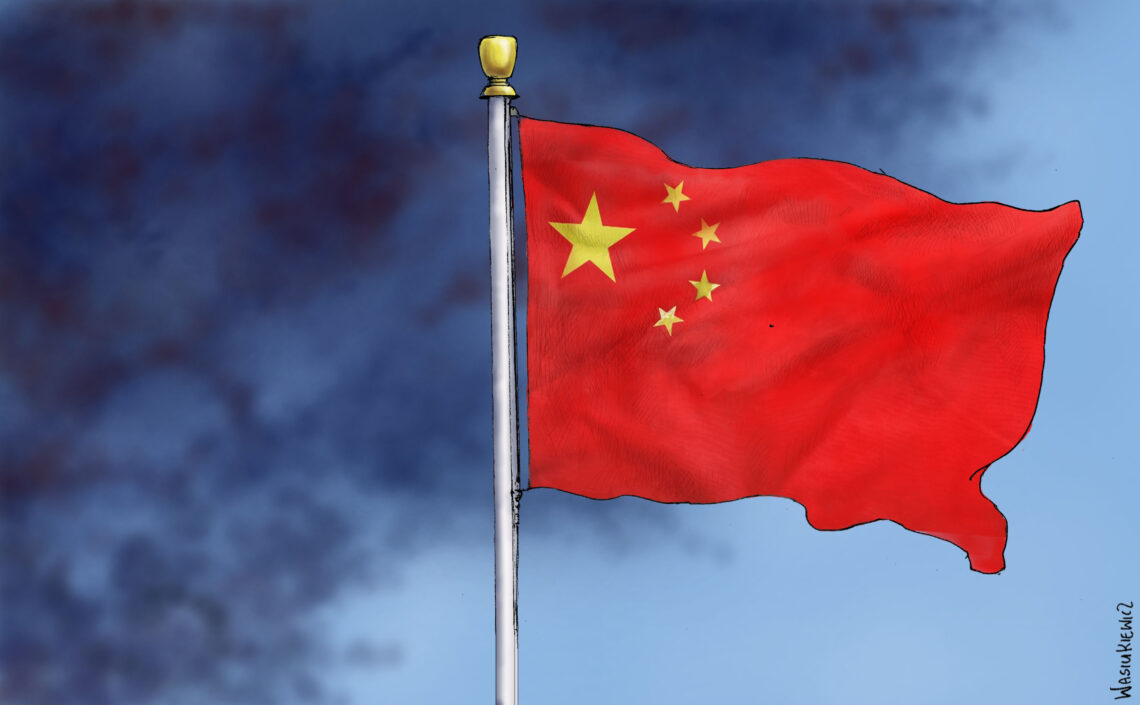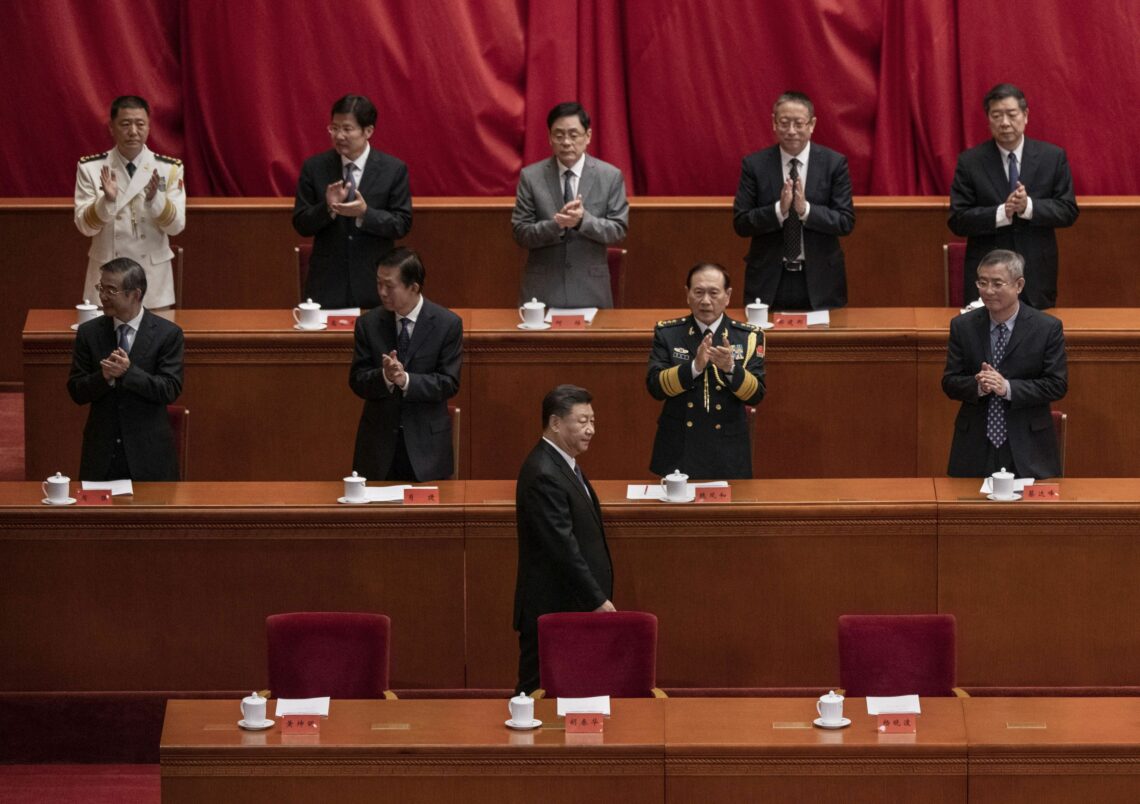China prepares for a storm
Beijing’s recent moves to win over allies and beef up its military made it clear that China saw conflict with the West as a possibility. Now, China’s new five-year plan will develop policies meant to insulate it from the negative effects of the great power competition.

At the end of October, the Central Committee of the Communist Party of China held a plenary meeting. The focus was preparations for the coming five-year plan, which the National People’s Congress will pass at the start of next year. The discussion also included a long-term plan to 2035, as well as various internal, foreign and security policy issues.
One of the plans’ main objectives is to prepare the country for an accelerating conflict with Western powers, especially the United States. Over the past decade, China has gained a freer hand. It wants to continue becoming less dependent on global systems.
The core goal of the new five-year plan, the country’s 14th, is to make China the world’s foremost industrial and economic powerhouse. Beijing wants to achieve this by developing innovative technology and increasing domestic growth. The strategy represents a pivot in economic policy away from exporting manufactured goods. The intention is not to create a Western-style economy, with growth mainly based on increasing consumer demand. Instead, Beijing wants to increase investment in research and development (R&D), while allowing households to maintain their high savings rates.
Logical policies
For the first time, the plan sets no growth target – the focus is on quality rather than quantity. The “dual circulation” strategy (where the “internal circulation” cycle of production, distribution and consumption is supplemented by “external circulation”) is supposed to bring out the best in the country’s domestic market.
Beijing wants to hedge against the potential negative economic effects of the great power competition.
The plan does, however, set targets for innovation and environmental protection. The political leadership wants to hedge against the potential negative economic effects of the great power competition, including sanctions. It is therefore trying to make China more self-reliant in critical industries like food production, semiconductors and energy.
In the short term, President Xi’s policies will aim to maintain China’s strong position as an exporter. It is a logical move, since it will help the country recover from the Covid-19 crisis. So far, those policies have been successful. Exports have increased by more than 10 percent over the year to October. Employment has risen, boosting consumer spending.
In foreign trade and investment, China has been striving to decouple from the dollar-based global monetary system for some time now. However, the country remains dependent on international trade and has focused its diplomacy on securing resources, trade routes and export markets. The Belt and Road Initiative (BRI) is not only an economic tool for market access, but is also – even primarily – a political one to make other countries dependent on China.
China has become the biggest trading partner for most East and Southeast Asian countries. As part of its effort to reinforce its position in the region, in November it signed onto the Regional Comprehensive Economic Partnership (RCEP), along with Japan, South Korea, the countries of the Association of Southeast Asian States (ASEAN), Australia and New Zealand, solidifying trade relationships across an enormous area. Moreover, Beijing is stockpiling commodities, which shows that it is preparing for increased tension.
Consolidating power
President Xi is engineering a paradigm shift in China’s global posture: the Middle Kingdom should become a hegemon, one at least comparable to the United States. To achieve this goal, he first consolidated his own power. This is designed to allow for more efficient actions and reactions.

He purged the party and increased the head of state’s power. The traditional rule, by which a leader’s time at the helm was limited to 10 years, was scrapped. Investments in the military have increased massively, especially in the navy and air force. Chinese armament suppliers are becoming global players. Beijing is pushing the extension of strategic infrastructure in roads, railways and ports.
The preamble of the constitution of the People’s Republic now reflects President Xi’s strategy and refers to the reassertion of Chinese economic, political and military power. During an emotional speech in October, on the occasion of the 70th anniversary of China’s involvement in the Korean War, President Xi declared that China has nothing to fear from “any country or any army, no matter how powerful they used to be.” The words were clearly aimed at Washington.
The strongest symbols of U.S. naval power are its aircraft carriers. China therefore developed “aircraft-carrier killer” missiles, and tested them in August. These missiles can travel a few thousand kilometers and can hit a moving ship. The aim is to reinforce the regime’s claims of strength and power.
Taiwan issue
The official notes published from the Central Committee’s meeting show calls for increasing assertiveness in foreign and security policy. Beijing has always considered Taiwan part of China, but this time the topic was given particular priority. The Chinese navy and air force have increased their activity around the island, proving that Taiwanese independence is a nonstarter for the People’s Republic.
Taiwan is an extremely successful democracy and one of the U.S.’s most important allies in its effort to contain China. It is a leading industrialized country and the world’s largest producer of semiconductors. The people of Taiwan want to maintain their freedom. For them, recent developments in Hong Kong are a troubling omen.
Taiwan remains an indispensable partner in the U.S. endeavor to contain China.
The U.S. has long worked to contain China. The policy became all the more obvious under the Trump administration, though it also played a key role in the strategy of the Obama administration. In fact, the Trans-Pacific Partnership – from which the U.S. eventually pulled out – was intended to reinforce this strategy. Taiwan remains an indispensable partner in this endeavor, despite Beijing’s efforts to make it a diplomatically excluded pariah.
The Chinese leadership’s more belligerent tone on the Taiwan issue, as well as China’s expensive naval operations around the island, could force Beijing into more provocative action. It has made walking back or yielding on the issue increasingly difficult. The proud, free, successful island nation is in jeopardy. It is crucial for democratic East Asian and Pacific nations, like South Korea and Japan, but also Australia and New Zealand, that Taiwan remains free. It is also important for stability throughout Asia, and for world peace.
No time for weakness
The Trump administration has resolutely supported Taiwan. The first call Mr. Trump made to a foreign leader after being elected came in December 2016 to Taiwan’s President Tsai Ing-wen, much to Beijing’s dismay. Recently, U.S. Health and Human Services Secretary Alex Azar visited Taiwan, the highest-ranking cabinet member to do so in decades. Such political signals, as well as the U.S. navy’s frequent freedom of navigation operations in the region, have made it clear to Beijing that Washington is ready to protect Taiwan’s freedom.
China is hoping for a better relationship with what it thinks may be a weaker U.S. administration coming into office in January. The Biden White House will have to make it very clear to the Chinese leadership that the U.S. is ready to fight – and even go to war – over Taiwan’s freedom. Just as with the Munich Agreement of 1938, showing weakness to avoid conflict will not succeed. Winston Churchill’s words then to British Prime Minister Neville Chamberlain come to mind: “You were given the choice between war and dishonor. You chose dishonor and you will have war.”
A war between China and the U.S. may still be avoided. But it is becoming increasingly likely, regardless of who is in the White House.
